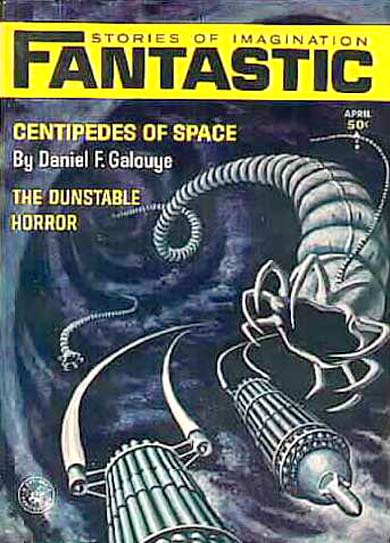Summary:
 This is one of Ursula Le Guin's more cleverly plotted tales. Mr. Underhill, a fifty-ish bumbling wizard, serves a small village. His spells don't often work and he hides under his hill when strangers arrive, but he's the best they have.
This is one of Ursula Le Guin's more cleverly plotted tales. Mr. Underhill, a fifty-ish bumbling wizard, serves a small village. His spells don't often work and he hides under his hill when strangers arrive, but he's the best they have. A new man, Blackbeard the Sealord of Pendor, comes to town and tells his tale: A dragon had his people's treasure, and seven mages arrived to destroy him. However, he's fled. They track him again to find dragon bones, presumably killed by an unknown wizard, who has made off with the treasure.
Blackbeard had followed the green glow of his oaken staff to this island and wishes to reclaim his treasure. Via black magic, he knows Mr. Underhill's true name, which gives him power over Mr. Underhill. They battle, and he forces Mr. Underhill to assume his true form.
Commentary:
Mr. Underhill's true form is foreshadowed in the opening:
"Mr. Underhill came out from under his hill, smiling and breathing hard. Each breath shot out of his nostrils as a double puff of steam, snow-white in the morning sunshine...."and after he's revealed the controlling nature of truenames:
"Somehow the minute spent watching Palani and the children had made him very hungry."Mr. Underhill's a dragon. Readers might guess, but guessing doesn't rob the story of its pleasure since it is well constructed.
The idea of truenames is curious:
"When you children are through school and go through the Passage, you'll leave your child-names behind and keep only your truenames, which you must never ask for and never give away. Why is that the rule?"
"To speak the name is to control the thing."Where is this true? I didn't buy it the first time I read this, eons ago. As an idealistic youth, I thought we could understand and deal with each other better if we knew one another's true nature.
But there is truth behind Le Guin's truenames. Young people leave the nest to discover themselves, but often if we allow labels, peoples will flatten the label, flatten labeled people into strawmen to knock down. Hand people your label and people can knock down straw-man likeness of yourself, which pleases observers that they've won. It doesn't matter if they're no where near the target. It's a triumph.
You'll see this in any tried-and-true political faction. "X is a democrat/republican/communist, etc, and all such love [insert vile crime or often a misconstrued event that the audience is sure to hate]. Therefore, X is to be loathed." Often this construction involves logical fallacies, which no one pays attention to.
Because Blackbeard did not understand Mr. Underhill's true nature, the true name failed. So Le Guin flouts the idea of labels we slap on people. Labels are not enough. Mr. Underhill seems a mysterious and secretive yet bumbling, talentless old fool. This conceals his true, devouring/greedy nature. I don't think readers are meant to despise Mr. Underhill. Rather, we've been made to sympathize as he's invited people over for dinner, helped people, socialized, and he's only defending himself. On the other hand, he does devour the village (which he probably would have done whether they highly esteemed him or not).
The POV of this tale is also curious. It seems to be omniscient.

No comments:
Post a Comment